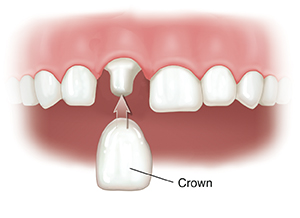Treatment for Restoring Your Tooth: Crowns
Your smile is what lights up your face. But having damaged teeth may make you feel too self-conscious to smile. If you have a single damaged tooth, your healthcare provider may recommend a crown. Read on to learn more about this treatment choice.
What is a crown?
A crown is used to restore a damaged tooth to its normal size and shape. It may be made of metal, ceramic, or porcelain fused to metal. If your crown will be visible when you smile, your dentist will try to match it to the color of nearby teeth.
 |
| The crown is adjusted for fit. Then it is cemented into place. |
What to expect during treatment
Your treatment experience may be as follows:
-
Preparing your tooth. A crown needs to be the same size as the original tooth. Your dentist will reduce the damaged tooth so that the crown will fit over it. Then an impression of the prepared tooth and the opposing tooth will be taken.
-
Between visits. Some dental offices are able to create and fit the new crown at the same appointment. For those that don't, it will take 1 to 3 weeks for a lab to make your permanent crown. To protect the prepared tooth during that time, you may have a short-term (temporary) crown. Keep your mouth extra clean during this time. To prevent pulling off the temporary crown, pull floss out sideways, not straight up or down. And stay away from sticky foods. Ask your dentist in advance what you should do if the temporary crown comes off.
-
Fitting your crown. At your follow-up visit, your dentist removes the temporary crown and puts on the permanent crown. They check the fit. After making adjustments, the dentist cements the crown into place. If you have any problems with the crown later, call your dentist.
When to call your dentist
Call your dentist if any of the following occur:
-
The crowned tooth hurts or feels sensitive to heat, cold, or biting pressure.
-
The crown chips, comes loose, or falls out.
-
The gums at the base of the crowned tooth swell, bleed easily, or get red or tender.
-
The bite does not feel right.
Online Medical Reviewer:
Jessica Gotwals RN BSN MPH
Online Medical Reviewer:
Michael Kapner MD
Online Medical Reviewer:
Rita Sather RN
Date Last Reviewed:
12/1/2022
© 2000-2024 The StayWell Company, LLC. All rights reserved. This information is not intended as a substitute for professional medical care. Always follow your healthcare professional's instructions.